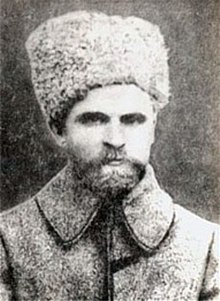Mykhailo Omelianovych-Pavlenko
Mykhailo Omelianovych-Pavlenko | |
|---|---|
 | |
| Born | 8 December 1878 Tiflis, Tiflis Governorate, Russian Empire |
| Died | 29 May 1952 (aged 73) Paris, French Fourth Republic |
| Allegiance | |
| Service/ | Imperial Russian Army Ukrainian Galician Army Ukrainian People's Army Ukrainian Liberation Army Hilfspolizei |
| Years of service | 1904–1921 1943–1945 |
| Rank | Lieutenant General |
| Battles/wars | First World War Ukrainian–Soviet War Second World War |
Mykhailo Omelianovych-Pavlenko (Ukrainian: Михайло Омелянович Павленко; 8 December 1878 – 29 May 1952) was the Supreme Commander of the Ukrainian Galician Army (UHA) and of the Army of the Ukrainian People's Republic. Later, he served as Defence Minister for the Government-in-exile of the Ukrainian People's Republic.
Early life[]
Mykhaylo Omelianovych-Pavlenko was born in Tiflis (present-day Georgia). His father, Volodymyr, was an officer in the Russian Imperial Army.[1] His mother was of a Georgian aristocratic family.[1] Omelianovych-Pavlenko attended the military academy in Petersburg, graduating in 1900.[2] He had a younger brother Ivan who later was fighting along with him.
Early Military Service[]
Pavlenko participated in the Russo-Japanese war as a company commander. Later, in 1910, he graduated from the General Staff School.
World War I[]
During World War I, Pavlenko served as commander of many units - including a Ukrainian brigade in Yekaterinoslav.[3]
In the spring of 1917, Omelianovych-Pavlenko became an active supporter of Ukrainian independence, and initiated the creation of the .[2] He also initiated Ukrainian military academies in Zhytomyr and Kamyanets-Podilsky.[2]
On December 10, 1918, Pavlenko assumed command of the Ukrainian Halitska Army, which he led until June 1919.[3]
After the union of the UHA and the army of the Ukrainian People's Republic, Pavlenko assumed command of the force. He served as special attache to Symon Petlura. Omelianovych-Pavlenko commanded the army of the UNR during the First Winter Campaign (1920).[3]
Inter-war Years[]
Pavlenko moved to Prague, where he headed the .[3]
World War II[]
During the Second World War, after Nazi Germany invaded the Soviet Union, Pavlenko headed a Ukrainian nationalist militia, the Ukrainian Liberation Army, that allied itself with the Axis Powers. At its peak it had 80,000 members.
After World War II[]

After World War II, Pavlenko moved to France, and became the Defence minister of the Government in exile of the Ukrainian National Republic from 1945 to 1948. Pavlenko was promoted to rank of Lieutenant General.[3]
Legacy[]
Due to decommunization policies a street in (Ukraine's capital) Kyiv that was named after (general of the Russian Empire) Alexander Suvorov was renamed after Omelianovych-Pavlenko in 2016.[4]
Publications[]
Pavlenko authored four books: , (published in 1929), , (published in 1934), and two books of memoirs (published in 1930 and 1935).[3]
References[]
| Wikimedia Commons has media related to Mykhailo Omelianovych-Pavlenko. |
- ^ Jump up to: a b Генерал царської армії на службі УНР - Михайло Омелянович-Павленко
- ^ Jump up to: a b c В. М. Литвин - Академік НАН України, віце-президент НАН України, голова Народної Партії
- ^ Jump up to: a b c d e f Omelianovych-Pavlenko, Mykhailo
- ^ (in Ukrainian) Bandera Avenue in Kyiv to be - the decision of the Court of Appeal, Ukrayinska Pravda (22 April 2021)
- 1878 births
- 1952 deaths
- Military personnel from Tbilisi
- People from Tiflis Governorate
- Generals of the Ukrainian People's Republic
- Defence ministers of Ukraine
- Ukrainian military leaders
- Ukrainian Galician Army people
- Russian military personnel of the Russo-Japanese War
- Russian military personnel of World War I
- Ukrainian people of World War I
- Recipients of the Order of St. George
- Burials at Père Lachaise Cemetery
